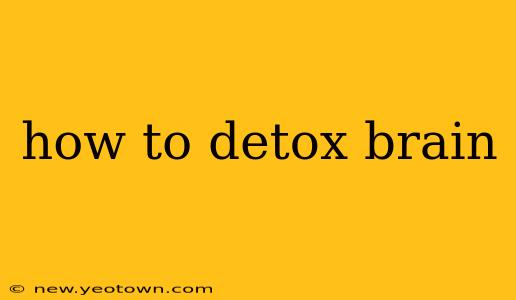How to Detox Your Brain: A Holistic Approach to Mental Clarity
We live in a relentlessly stimulating world. From the constant ping of notifications to the overwhelming news cycle, our brains are under siege. It's no wonder so many of us feel mentally fatigued, scattered, and overwhelmed. But just like our bodies, our brains benefit from a good detox. This isn't about a magic pill or a quick fix; it's about adopting a holistic approach that nourishes your mind and clears away the mental clutter. This journey involves nurturing your physical well-being, managing stress, and fostering mental clarity. Let's embark on this path together.
What Does a Brain Detox Actually Mean?
Before we dive into the practical steps, let's clarify what a "brain detox" truly means. It's not about literally flushing toxins from your brain – that's not how the brain works. Instead, it's about reducing the mental and emotional load that leads to stress, anxiety, and poor cognitive function. Think of it as a spring cleaning for your mind, creating space for better focus, creativity, and emotional well-being.
What are the signs my brain needs a detox?
This is a crucial question, as recognizing the signs is the first step. Common indicators include:
- Persistent brain fog: Difficulty concentrating, remembering things, or making decisions.
- Increased irritability and anxiety: Feeling easily frustrated or overwhelmed.
- Poor sleep quality: Difficulty falling asleep, staying asleep, or feeling unrefreshed upon waking.
- Lack of motivation: Feeling apathetic or lacking in drive.
- Emotional overwhelm: Feeling constantly stressed or emotionally drained.
How can I improve my sleep quality to support brain detox?
Sleep is crucial for brain health. During sleep, your brain consolidates memories, clears out toxins, and restores itself. Improving your sleep hygiene is a fundamental part of a brain detox. This includes:
- Establishing a regular sleep schedule: Go to bed and wake up around the same time each day, even on weekends.
- Creating a relaxing bedtime routine: This could include a warm bath, reading a book, or listening to calming music.
- Optimizing your sleep environment: Make sure your bedroom is dark, quiet, and cool.
- Limiting screen time before bed: The blue light emitted from electronic devices can interfere with sleep.
What are some effective stress-reduction techniques?
Stress is a major contributor to mental fatigue and overwhelm. Learning effective stress-reduction techniques is paramount:
- Mindfulness and meditation: These practices help you to focus on the present moment and reduce overthinking.
- Deep breathing exercises: Simple deep breathing can calm your nervous system and reduce stress hormones.
- Yoga and Tai Chi: These gentle exercises combine movement, breathwork, and mindfulness to promote relaxation.
- Spending time in nature: Studies show that spending time outdoors can reduce stress and improve mood.
How can I improve my diet to support brain health?
Your brain is highly dependent on nutrients. A healthy diet plays a vital role in cognitive function and overall well-being:
- Focus on whole foods: Fruits, vegetables, whole grains, and lean proteins provide essential nutrients for brain health.
- Limit processed foods, sugar, and caffeine: These can contribute to inflammation and impair cognitive function.
- Stay hydrated: Dehydration can impair cognitive function.
- Consider brain-boosting supplements: After consulting your doctor, you may consider supplements like omega-3 fatty acids or B vitamins.
What role does digital detox play in brain detox?
In our hyper-connected world, a digital detox is often an essential component of a brain detox. Excessive screen time can lead to information overload, sleep disruption, and increased stress. Consider:
- Setting limits on screen time: Use apps to track and limit your usage.
- Taking regular breaks from screens: Step away from your devices throughout the day to rest your eyes and mind.
- Creating screen-free zones: Designate specific areas or times of day as screen-free zones.
The Power of Movement and Exercise
Physical activity is often overlooked in mental well-being discussions, but it's incredibly vital. Exercise boosts blood flow to the brain, reduces stress, and improves mood. Find an activity you enjoy – whether it's dancing, hiking, swimming, or simply a brisk walk.
Conclusion:
A brain detox isn't a one-time event; it's a lifestyle shift. By incorporating these strategies into your daily routine, you'll not only feel clearer and more focused but also experience a greater sense of overall well-being. Remember that consistency is key. Start small, be patient with yourself, and celebrate your progress along the way. Your brain will thank you for it.

